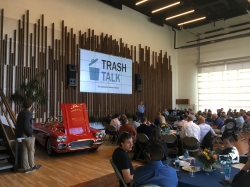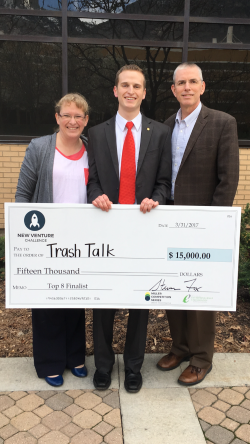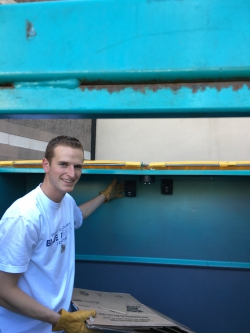BYU Students Waste No Time Taking out the Trash
PROVO, Utah – Oct 30, 2018 – Like many students at BYU, Matthew Liddle wanted to leave his mark on the world. But if you were to ask him, he would actually say that he wanted to remove his mark—by reducing his carbon footprint and improving his care for the environment. Fortunately for Liddle, there was a way to do both.
While at BYU, Liddle and a group of classmates established TrashTalk, a company focused on improved recycling and waste hauling. The idea for the business began during a class under the Crocker Innovation Fellowship, where students of various educational backgrounds are put into teams to create a business that could change the world.
“We went out looking for a problem we could solve that involved helping the environment,” says Liddle, a BYU graduate from Orem who received a bachelor’s degree in mechanical engineering and a minor in business strategy in April 2017. “We wanted to be good stewards of the earth and create solutions that would contribute to that cause.”
As the team members talked with recycling and waste hauling managers, they noticed two frequent problems in the industry. The first was that many haulers were not sure when to schedule pickups due to irregular filling in bins. The second was that people would throw their recycling in garbage cans when recycling bins were full. These issues resulted in time and fuel waste as well as reductions in recycling efforts—all of which contributed to increased emissions and pollution.
To address these challenges, the group established a plan for implementing effective and efficient pickups. Liddle knew that if the team could obtain data on how full recycling and waste containers were at any given time, they would then be able to optimize routes and prevent overflowing containers.
“We started out with a simple test at BYU,” Liddle says. “We put QR codes on a number of recycling containers across campus. When the containers needed to be emptied, we had custodians scan the code. After analyzing the data, we found that 80 percent of the labor time for collection was cut because it was unnecessary.”
The astonishing results convinced Liddle that the idea had greater potential to disrupt the recycling and waste industry than previously imagined. In response, Liddle built out the prototype further, using his engineering background to create a sensor that would measure and indicate how full a dumpster or bin is. That sensor is now the heart of TrashTalk, which has enabled the venture to come to life.
Liddle credits BYU Marriott resources such as the Ballard Center for Economic Self-Reliance, the Crocker Innovation Fellowship, and the Rollins Center for Entrepreneurship & Technology for the success of TrashTalk. He was quick to emphasize how the Ballard Center in particular played a significant role in his personal growth as an innovator.
“The Ballard Center has helped push my thinking in how to create social good,” Liddle says. “I don’t want to just be a successful entrepreneur—I want to create a positive difference in the world. And I have had experiences with the Ballard Center that have challenged my perspective and pushed me in that regard.”
But personal development hasn’t been the only benefit of working with the Ballard Center. Liddle expressed his gratitude for the financial assistance, mentoring, connections, and continued support—all of which have been major players in the venture’s ongoing stability.
“TrashTalk would not still be around if it weren’t for those at the Ballard Center,” Liddle says. “They definitely want to help ventures succeed.”



Media Contact: Chad Little (801) 422-1512
Writer: Brendan Gwynn



